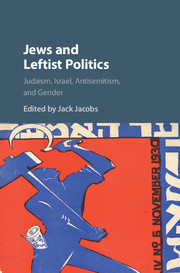Book contents
- Frontmatter
- Contents
- List of Contributors
- Acknowledgments
- Introduction
- PART ONE POLITICAL IMPLICATIONS OF JUDAISM
- PART TWO ANTISEMITISM AND THE LEFT
- 2 The Dualisms of Capitalist Modernity: Reflections on History, the Holocaust, and Antisemitism
- 3 Marxism's Other Jewish Questions
- PART THREE ISRAEL, ZIONISM, AND THE LEFT
- PART FOUR JEWS AND COMMUNISM
- PART FIVE GENDERED PERSPECTIVES
- PART SIX CANONICAL FIGURES
- PART SEVEN CASE STUDIES
- Glossary
- Index
2 - The Dualisms of Capitalist Modernity: Reflections on History, the Holocaust, and Antisemitism
from PART TWO - ANTISEMITISM AND THE LEFT
Published online by Cambridge University Press: 13 April 2017
- Frontmatter
- Contents
- List of Contributors
- Acknowledgments
- Introduction
- PART ONE POLITICAL IMPLICATIONS OF JUDAISM
- PART TWO ANTISEMITISM AND THE LEFT
- 2 The Dualisms of Capitalist Modernity: Reflections on History, the Holocaust, and Antisemitism
- 3 Marxism's Other Jewish Questions
- PART THREE ISRAEL, ZIONISM, AND THE LEFT
- PART FOUR JEWS AND COMMUNISM
- PART FIVE GENDERED PERSPECTIVES
- PART SIX CANONICAL FIGURES
- PART SEVEN CASE STUDIES
- Glossary
- Index
Summary
This chapter seeks to relate historical changes in public responses to the Holocaust and understandings of antisemitism, especially on the left, to the historically changing configurations of capitalist modernity since 1945. Thinking about the two together can be clarifying: public responses to the Holocaust have tended to be structured by an opposition between abstract modes of universalism and concrete particularism – an opposition that also is constitutive of modern antisemitism. These responses have shifted with and are related to the changing configurations of capitalist modernity from the statist Fordist–Keynesian configuration of the 1950s and 1960s to a subsequent neoliberal one. Consideration of these large-scale configurations can illuminate the historical character of those responses; at the same time examination of those responses can shed light on these larger historical configurations. This problem complex can be fruitfully approached on the basis of a critical theory of capital, on the one hand, and one of antisemitism, on the other.
Within the framework of a critical theory of capital the opposition between abstract modes of universalism and concrete particularism is neither ontologically given nor historically contingent but is intrinsic to the fundamental forms that structure capitalism, namely, the commodity and capital. Such an analysis grasps both terms of the opposition – abstract universality and concrete particularity – as remaining bound within the framework of capitalist modernity, however much positions based on each of them have understood themselves to be fundamentally “critical” or “radical,” pointing beyond the existing order.
This essay seeks to problematize such “critical” positions by highlighting the one-sided character of each and by drawing attention to a historical shift from the predominance of critiques based on abstract universalism, characteristic of classical liberal thought and, with important differences, working-class movements, to the ascendancy of positions focused on concrete particularity, such as those expressed by liberation struggles that can be deemed anticolonial in the broadest sense. By suggesting that both sorts of responses remain immanent to capitalism, to its double character, the approach presented here problematizes the relation of each to the Holocaust and to antisemitism while contributing to a reflexive critique of emancipatory theory.
- Type
- Chapter
- Information
- Jews and Leftist PoliticsJudaism, Israel, Antisemitism, and Gender, pp. 43 - 66Publisher: Cambridge University PressPrint publication year: 2017
- 2
- Cited by



